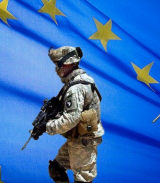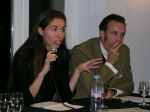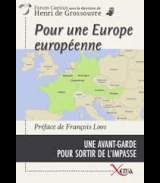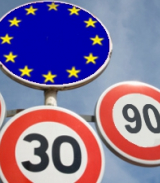Recherche avancée

 |
Pente glissante : la réatlantisation de l Europe de la défense
The Federalist Year LV, 2013
31 déc, 2013
La réatlantisation de l’Europe de la défense est en marche.[1] Que ce soit la crise en Ukraine, offrant visiblement un formidable prétexte aux efforts de rebond de l’OTAN ; ou notre inexorable enfermement dans le piège de la coopération avec l’Amérique en matière d’armement ; ou les pressions qui s’accentuent pour civilianiser la PSDC y compris ses groupements tactiques ; ou encore le nouveau discours de symbiose transatlantique ; il s’agit à chaque fois de manifestations palpables d’un choix délibéré de la part des élites euro-occidentales. Un choix qui va pourtant à contre-courant de ce que dicteraient les événements, le bon sens, nos intérêts et notre dignité. Sans parler du désir (assez peu perceptible, il faut le dire) de tenir, tant bien que mal, notre place dans la « mêlée mondiale »
|
 |
Lancement du livre Pour une Europe européenne. Une avant-garde pour sortir de l’impasse
Librairie Kléber, Strasbourg
06 nov, 2007
Le 6 novembre à la Librairie Kléber à Strasbourg eut lieu le lancement du livre Pour une Europe européenne. Une avant-garde pour sortir de l’impasse sous l’égide du Forum Carolus."Cet événement a été l’occasion de mener un débat autour de l’impératif d’une relance de la construction européenne par la création d’une avant-garde sur la base d’un « noyau dur » franco-allemand. Cette démarche est fondamentale pour ne pas aboutir à une impasse et relever le défi des alliances stratégiques permettant à l’Europe de renforcer sa souveraineté."
|
 |
L'avant-garde européenne : diagnostic, remède, raison d être
Intervention aux Assises des Associations d'Europe
28 sept, 2007
La réflexion qui suit se propose de partir d’un diagnostic (celui de l’impasse), elle se poursuit en identifiant le remède (projet d’avant-garde), pour se clore par l’évocation de la raison d’être de toute initiative européenne digne de ce nom (sauvegarde de notre liberté de choix).
|
 |
Une avant-garde pour préserver et renforcer la souveraineté européenne
Pour une Europe européenne (ed. H. de Grossouvre)
14 sept, 2007
« L’avant-garde européenne n’a de sens et de légitimité que si elle est inspirée par une vision stratégique, visant au renforcement de tous les aspects de la souveraineté européenne. Seul un tel projet pourra contribuer à la préservation d’une ‘certaine idée de l’Europe’ : un acteur géopolitique à part entière capable de garantir notre sécurité, de promouvoir nos valeurs et nos intérêts et de défendre notre modèle économique, social, environnemental et culturel. Pour ce faire, il faut clairement se démarquer des scénarios alternatifs et veiller à ne pas céder aux facilités et aux fausses sirènes.
|
 |
Devenir souple pour maintenir l’ensemble: la logique et les pièges du concept d’«intégration différenciée »
The Federalist, XLVIII, 2006, N° 1
28 oct, 2006
Le présent article donne un bref aperçu des aspects terminologiques, historiques, théoriques et politiques des scénarios « d'intégration différenciée ». Il part du fait que si la « flexibilité » est le seul moyen de consolider l'acquis et de poursuivre le projet d'intégration, la différentiation ne mène pas automatiquement à une Europe plus ambitieuse, plus puissante et plus européenne. Afin d’assurer un tel résultat, les pionniers de la flexibilité doivent prêter une attention particulière à deux critères cruciaux.
|
 |
Prospective sur la défense européenne
Biztonságpolitikai és Honvédelmi Kutatások Központ
06 aout, 2006
Il convient d’abord de souligner que ni les élections françaises de 2007, ni celles aux Etats-Unis en 2008 n’altèreront de manière notable – c’est-à-dire outre les gestes et effets d’annonce programmés pour ces occasions – les orientations traditionnelles de la politique étrangère et de sécurité des pays en question. De même, les péripéties du nouveau traité européen, le rythme effectif de la fuite en avant de l’UE par l’élargissement, et les multiples initiatives transatlantiques basées sur des changements d’emballage à Washington sont parfaitement secondaires du point de vue de l’évolution réelle de la construction européenne et de nos relations avec les Etats-Unis.
|
 |
L'idée d'avant-garde replacée dans son contexte
intervention Réunion du Forum Carolus, Strasbourg
25 nov, 2005
L’Europe d’aujourd’hui se caractérise par un flou stratégique et identitaire : elle est sans contours géographiques et politiques. Ses frontières géographiques restent toujours imprécises aussi bien vers l’Est et le Sud, que dans la direction de l’Ouest. La souveraineté européenne se retrouve, elle, dans une sorte de zone grise : les Etats-membres abdiquent des pans entiers de leur souveraineté nationale sans qu’il y ait au niveau européen une entité politique prête et capable de défendre la capacité de décision et d’action autonome des Européens.
|
 |
L'Europe en cercles multiples: variations sur le thème de l intégration «flexible»
Külügyi Szemle 2005/3-4
15 nov, 2005
La présente analyse étudie l’un des points cruciaux des débats sur l’évolution de l’Union européenne, à savoir la problématique de la « différenciation ». En soulignant au sujet de cette méthode d’intégration connue sous les noms de « Europe à plusieurs vitesses », « noyau dur » ou « Union à géométrie variable » qu’elle n’est en soi ni positive, ni négative. La question de savoir si la montée en puissance de la différenciation mènera à la désintégration ou à la redynamisation de l’intégration dépend in fine de deux choses : au service de quelle politique et suivant quelles modalités les mesures visant à la flexibilité seront-elles mises en œuvre.
|
 |
L'avant-garde comme nécessité et opportunité
Les Débats du Forum Carolus
13 oct, 2005
"L’Europe intégrée où il n’y aurait pas de politique, se mettrait alors à dépendre de quelqu’un du dehors qui, lui, en aurait une." (Charles de Gaulle, 1961). Il y a une seule question qui vaille dans l’état actuel de l’Union européenne. C’est de savoir si cette crise est enfin « la » crise. La réponse dépend uniquement de la volonté politique des dirigeants des Etats membres, au premier chef desquels la France et l’Allemagne.
|
 |
La souffrance de l'Union et le remède
Népszabadság Online
04 juin, 2005
Il y a une seule question qui vaille dans tout ce chaos autour du traité constitutionnel. C’est de savoir si cette crise est enfin « la » crise. La réponse dépend uniquement de la volonté politique des dirigeants des Etats membres, au premier chef desquels la France et l’Allemagne. La souffrance est le résultat non pas du, mais des élargissements. Les chefs d’Etat et de gouvernement des Six, en 1969 à la Haye, avaient beau dire ne pas marquer leur accord pour l’ouverture des négociations d’adhésion que « pour autant que les Etats candidats acceptent les traités et leurs finalité politiques ».
|
 |
La défense européenne au centre des débats
Journal Francophone de Budapest
03 déc, 2003
Quelques mois après le paroxysme de la crise irakienne (du moins en ce qui concerne les affrontements transatlantiques et intra-européens qu’elle avait engendrés), en pleine phase finale de la Conférence intergouvernementale (CIG) censée décider de la Constitution européenne, et à la veille de l’adhésion des dix nouveaux membres à l’Union, le dossier de la défense européenne semble avoir atteint son heure de vérité.
|
 |
Le retour aux fondements serait-il un iconoclasme ?
Journal Francophone de Budapest
14 mai, 2003
A l’occasion de l’anniversaire de la déclaration Schuman, il est difficile de ne pas s’interroger sur la portée et la pertinence du discours du salon de l’Horloge par rapport à l’état actuel de la construction européenne.
|
 |
La guerre en Irak: vers une nouvelle logique pour la défense européenne?
Journal Francophone de Budapest
02 avril, 2003
Le constat des divisions parmi les Etats membres de l’UE au sujet de l’intervention américaine en Irak se conjugue avec la perspective d’un élargissement imminente à 10 nouveaux pays pour renforcer la prise de conscience sur l’impossibilité d’avancer ensemble dans les domaines ultrasensibles comme celui de la politique étrangère et de défense.
|
 |
Le vieux couple franco-allemand réinventera-t-il la nouvelle Europe ?
Journal Francophone de Budapest
05 févr, 2003
A la lumière d’une remarque acerbe du secrétaire d’Etat américain à la Défense sur la France et l’Allemagne, il convient de revenir sur l’état actuel et les projets d’avenir du couple franco-allemand qui vient de fêter le 40ème anniversaire du Traité de l’Elysée.[1]
|
|
 |
Les plus lus


|



